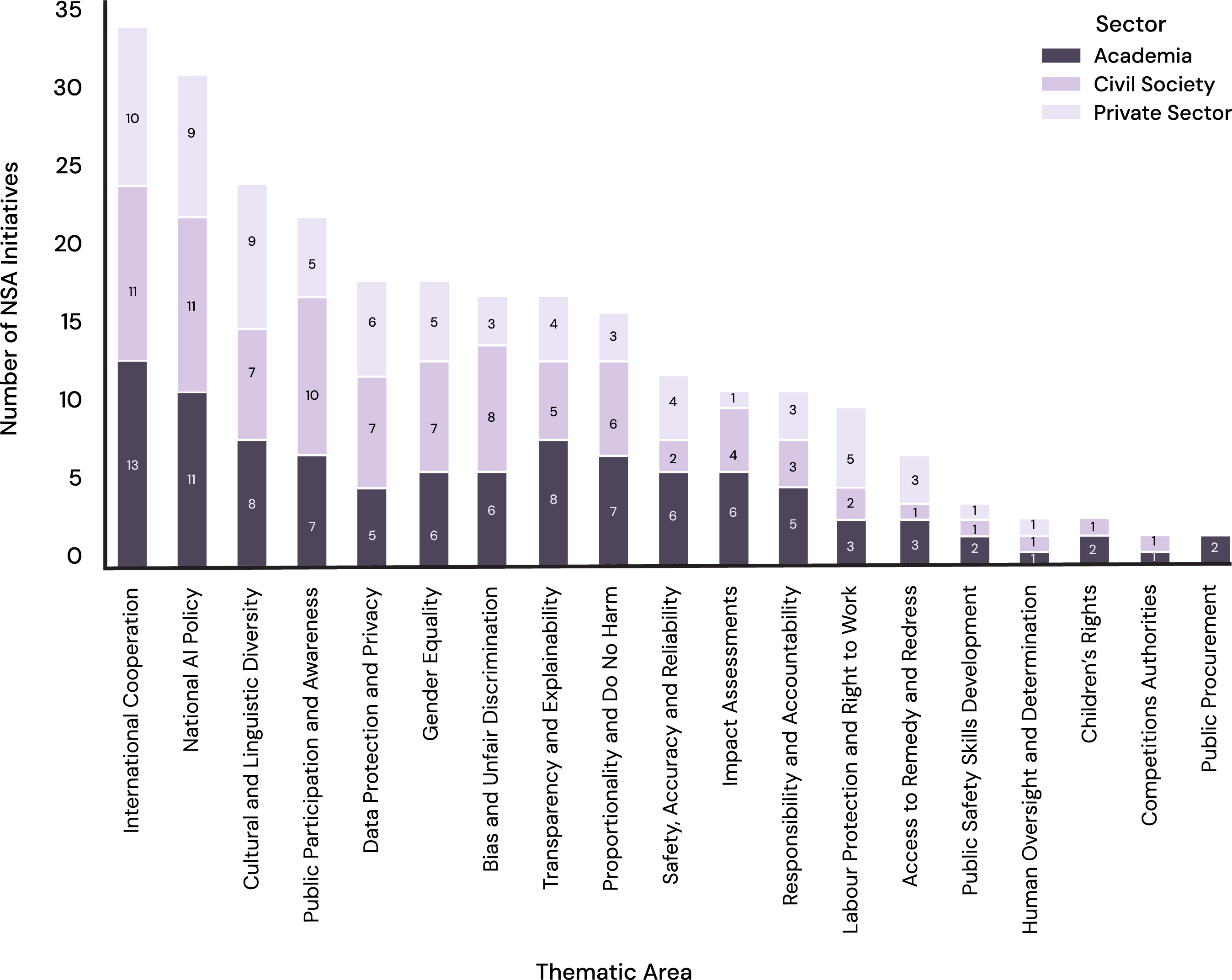The Outsized Role of African Civil Society and Universities in Advancing Responsible AI
Tags
Across Africa, civil society organizations working on AI are taking on an outsized role in advancing responsible AI practices despite facing significant challenges. This article presents findings from the Global Index on Responsible AI, showcasing the efforts of African civil society groups and academic institutions in the AI sector. We also examine the unique challenges these groups encounter in scaling their work and amplifying their impact.
The Global Index on Responsible AI, a study by the Global Center on AI Governance, collected data from 138 countries and jurisdictions, including 41 in Africa. The study found that civil society and university initiatives addressing inclusion-related aspects of responsible AI are instrumental in protecting and promoting human rights in the context of AI - often surpassing government-led efforts on these issues.
One example is the Polaris Association’s National Youth Consultation initiative in Senegal, which supports the country’s national AI strategy by involving youth from diverse sectors in discussions on AI ethics and its implications for national policy. Similarly, AfroLeadership, a Pan-African civil society organization based in Cameroon, tackles essential AI ethics issues such as data justice and governance.
The chart below illustrates the various issue areas within responsible AI that organizations across Africa are actively addressing.

Overall, the Global Index on Responsible AI identified non-state actors — civil society organizations, universities and private entities — working on responsible AI across 30 African countries. Many of these groups are notably active in areas such as gender equality in AI, cultural and linguistic diversity, bias and unfair discrimination, children’s rights in AI, labor protections and the right to work, and fostering public participation and awareness around AI.
South Africa, Tunisia, Benin and Morocco stand out for their dynamic civil society engagement in responsible AI. From an issue-focused perspective, it is notable that African non-state actors prioritize cultural and linguistic diversity in AI, as well as public participation and awareness—an emphasis that sets them apart from non-state actors in other regions. These organizations play a vital role in broadening discussions about AI’s impacts, holding governments and tech companies accountable, and enhancing public awareness of these pressing issues.
However, these organizations face significant challenges in amplifying their impact. While Africa is increasingly represented in global AI debates and decision-making, expertise and research from the continent are still seldom included in reports and discussions. Even when global papers address African contexts, they often rely on Global North research rather than locally-led studies as key evidence. This reflects a systemic exclusion of African voices and expertise in global AI conversations. To build an equitable and just future for everyone, everywhere, insights from the African continent must be heard and taken seriously. African-led research should be prioritized as a primary source of evidence on the realities and needs of the region it represents.
Another challenge is the lack of support for long-term research. Local research centers on the continent rarely receive the resources needed to pursue sustained, forward-looking studies on Africa’s AI future. Instead capacity-building efforts in Africa are often reactive, addressing emerging issues and working to “catch up”. Yet, research into medium and long term or even existential risks facing Africa is urgently needed. For instance, World Bank statistics indicate that by 2030, 90% of the world’s poorest people will live on the continent. Locally-driven research is crucial to examine the connection between these predictions and AI’s structural impacts on African societies and economies.
This research could include examining AI’s impact on job displacement and livelihoods in Africa, where workforce models from the US and the EU are often ill-suited to predict effects on predominantly informal economies, like those across much of Africa. Additionally, it could involve polling and studying public perceptions of AI, including how religious beliefs may shape these attitudes. For instance, partners of the African Observatory on Responsible AI at the Laboratoire d’Analyse des Sociétés et Pouvoirs / Afrique – Diasporas (LASPAD) at the University of Gaston Berger in Senegal have published research on these themes, underscoring the need for further study in this area.
Local research centers, with their deep understanding of regional dynamics, public attitudes, and political contexts, offer valuable insights that are particularly credible for local and regional policymakers. Empowering these centers is essential as they form a vital part of rich, agile and sustainable AI ecosystems that can address emerging issues, proactively monitor for rising concerns, and provide dynamic career pathways for AI professionals.
The recently published Continental AI Strategy by the African Union calls for the establishment of centers of excellence across the continent to address key issues such as peace and security. These centers aim to drive research that fosters nuanced, context specific insights into the socio-economic implications of AI in Africa’s diverse societies.
Such centers will contribute significantly to advancing African-led research on AI and addressing some of the issues outlined above, and should build off existing efforts and investments, including the AI for Development (AI4D) programme, supported by the International Development Research Centre of Canada, with the Swedish International Development Agency and the UK’s Foreign and Commonwealth Development Office, as well as FAIR Forward, supported by the Deutsche Gesellschaft für Internationale Zusammenarbeit (GIZ). These initiatives have had a significant impact in advancing the work and strengthening the capacity of AI knowledge systems on the cContinent, supporting many of the responsible AI initiatives led by academia, civil society and private actors found in the Global Index on Responsible AI.
Authors: Rachel Adams and Ana Florido
Acknowledgement:
This analysis is based on research funded by the International Development Research Centre (IDRC) and UK International Development under the AI4D program, as part of the African Observatory on Responsible AI.




